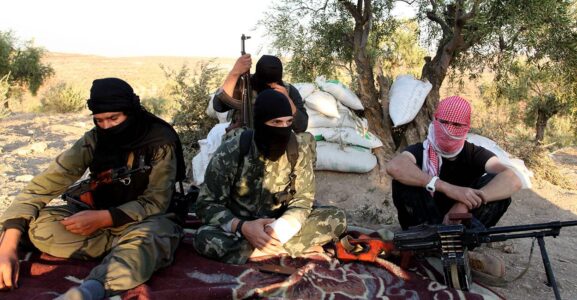
Islamic State terrorist group sees a bloody opportunity in the US-Taliban deal
On Sunday evening, a major prison in eastern Afghanistan was stormed by Islamic State Khorasan Province (ISKP), militants resulting in dozens of casualties and prisoners escaping. The complex attack continued for 24 hours, with shots heard through Monday. The attack began hours before a three-day ceasefire between the Afghan government and the Taliban was set to expire. The Taliban denied responsibility for the attack, but ISKP soon claimed that the assault was their work.
Even as the Taliban move toward peace talks with the Afghan government, a new reign of terror orchestrated by the Islamic State’s regional affiliate is taking shape in Afghanistan.
In order to attract recruits and distinguish itself from the Taliban, ISKP is exercising new tactics like targeted killing and complex attacks aimed to instill as much fear as they can. Targeted killing has increased in major cities, especially in the capital, Kabul. ISKP has proved capable of launching heart-wrenching, high-profile complex attacks, killing hundreds of people.
In May, ISKP militants stormed a maternity hospital in Kabul, killing newborn babies, mothers, nurses, and a police officer. On the same day they targeted a funeral gathering in Nangarhar through a suicide attack, killing dozens of people. Similarly, they conducted a complex attack on a Sikh temple in March, killing 25 worshippers, and frequently attack the Hazara minority. The group also claimed responsibility for an attack on the U.S. military’s Bagram airbase in Parwan province.
With the U.S.-Taliban peace agreement, ISKP stands ready to inherit the role of violent spoiler. It poses a serious danger as it attracts fighters from across the region. ISKP, with its global agenda, has been able to recruit fighters from more than a dozen countries. Militants under pressure in the Syria war – including foreign fighters from India, Iraq, Jordan, Saudi Arabia, and Syria — have joined ISKP in Afghanistan.
Surprisingly, the suicide attack on Afghanistan’s Sikh minority was attributed to one of their Indian fighters, who hailed from Kerala. Battle-hardened, educated, and professional fighters in the thousands are skillful in attracting foot soldiers and brainwashing the poverty-stricken population of Afghanistan.
With their fighters coming from Pakistan, Uzbekistan, and Tajikistan as well, ISKP has the capacity to destabilize Central Asia once it gets a firm foothold in Afghanistan. This remains one of the major concerns of Russia and Iran, which view ISKP as a group driven by Salafi ideology working to destabilize Central Asia.
One major challenge for ISKP, however, has been the xenophobic nature of Afghans and hate among local residents regarding the brutal tactics they Islamic State has used from the outset of their operations in the country. Moreover, extortion, taxation, and exploitation of mineral resources, which are major sources of revenue for ISKP, have also caused concerns among local Afghans. Thus, in addition to ideological propaganda, ISKP has been using coercion, force, intimidation, and empty promises of finances to recruit local fighters.
ISKP fighters are operative in far-flung areas. They have even been successful in getting safe havens in the capital, Kabul. ISKP has been active in nine provinces, mainly Nangarhar and Kunar in the east; Jawzjan, Faryab, and Badakhshan in the north; and Ghor in the center west. In the north, key Tajik and Uzbek commanders like Mawlawi Satar and Mawlawi Abdullah Majid have already joined the group, and are actively involved in the recruitment of ethnic Tajik and Uzbek fighters in their ranks.
When their regional leader, Aslam Farooqi, was captured in Kandahar — along with 12 Pakistani nationals, including four women, a Bangladeshi man, and two Russian speaking women — it is believed Farooqi was making an effort to contact groups in the south to further expand ISKP.
Some security experts believe that ISKP lacks the capability to launch complex attacks on its own. The Taliban’s hard-core wing, the Haqqani Network, is suspected of providing technical assistance to ISKP in conducting complex attacks. ISKP and the Haqqani Network share a mutual interest in undermining the Kabul government’s control and credibility by conducting attacks in major cities.
Thus, on one hand Taliban takes the blame of itself for attacks while on the other hand they portray the weakness of the government. Meanwhile, ISKP boosts its relevance. The Afghan government thus calls ISKP the new face of the Haqqani Network.
ISKP is an emerging threat that represents itself as a replacement for the Taliban. It seeks to establish a Caliphate beginning in South and Central Asia, which will expand as Muslim across the globe join. Should it achieve a stable foothold, the consequences would be horrendous — not only for U.S. national security interests but for the whole region. With their recent brutal attacks, ISKP has proved that we are faced with a renewed threat — a new reign of terror, limited compared to the Taliban’s reach but far more complex and violent.
Source: The Diplomat





